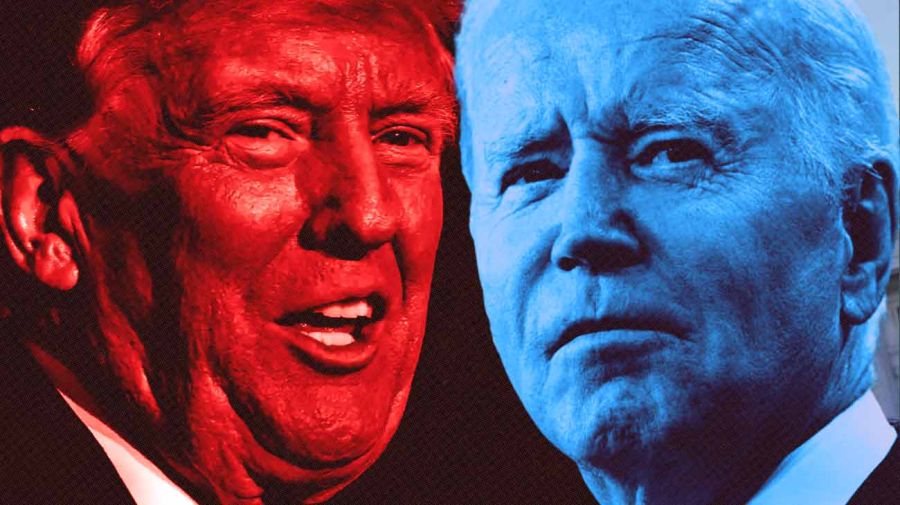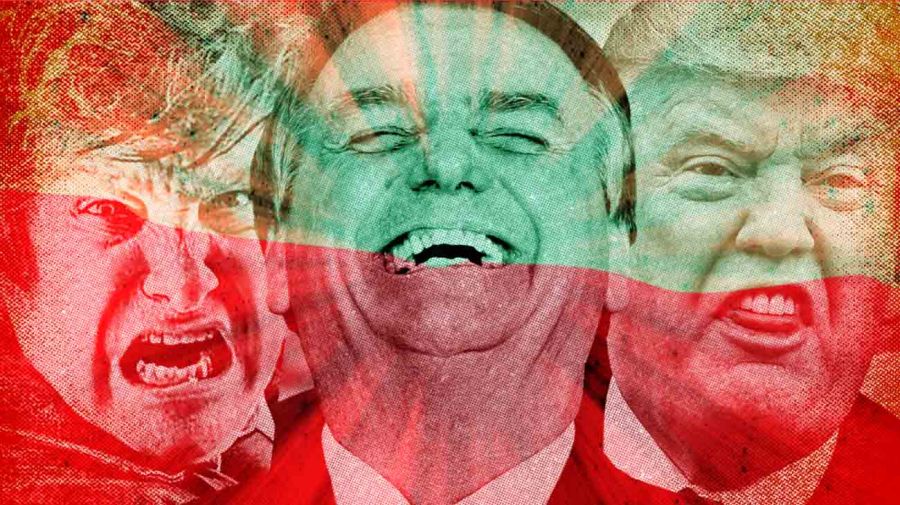Ian Bremmer is one of the United States’ most outstanding political analysts. His curriculum vitae includes having anticipated over a decade ago the decline of the global order divided between the G7 and the G20, while distinguishing the industrialised powers from the emerging markets. The new world anticipated by Bremmer is the ‘G-0,’ atomised into many powers who are not trying to fix any global agenda but to compete strategically for the economy, security and technology.
These three areas, explains Bremmer, will define the coming times. "This is a very exciting time to be alive, but it's also an extremely unsettling and difficult time,” he says with a certain enthusiasm. Especially given the advance of artificial intelligence and the tech giants which act as sovereign states: unprecedented historical times. Dynamics which will not only change the global systems of governance but also the human being and, of course, politics – in particular the liberal democracies currently in crisis, as in the United States, where armies of citizens are enraged with the political class due to the lack of opportunities and other "failings" of globalisation.
From New York, the founder of the Eurasia Group political risk consultants traces a dramatic panorama ahead of the US presidential elections. The land of liberty has remained immersed in a deep political crisis ever since the assault on Capitol Hill perpetrated by the followers of the ex-president and current candidate Donald Trump in rejection of the 2020 victory of Democrat Joe Biden.
"There is something significantly broken in the US political system. What should be underlined is that Trump might win easily. But it doesn't matter who wins, a huge number of Americans will not accept the legitimacy of these elections," indicated Bremmer.
More than three years on from the moments which shook the biggest liberal democracy in the world, the same protagonists will compete despite seeming "not suitable" for the presidency – Trump for having 91 criminal charges lodged against him (which might see him facing jail if he does not win) and Biden for the doubts over his cognitive abilities and the fact that he would be 86 at the end of his second term, should he be re-elected.
As is habitual, what happens in the United States trickles down to the rest of the Western hemisphere. At the other end of the continent, President Javier Milei has echoed the global anti-system phenomenon, wreathed in the social fury of Argentines after years of economic decadence. Adopting a discourse similar to Trump, he has scaled the summit of power on the back of an enemy: "the caste."
"Milei is both a symptom and a beneficiary of the broad anti-system sentiment growing across the world," analysed the political pundit.
What can we expect from the [US] presidential elections?
It's still early. I would say if the elections were today, Trump would win quite easily. I would say, I probably have a view that – let's say 60 percent – that Trump will win, but I have fairly low confidence in that call. It's very clear that if he is convicted of a felony before the election, that is probably the most significant opportunity that Biden has, because you'll have massive numbers of independents that are not prepared to vote for a convicted felon.
On the Trump side, you know, the age issue is playing out very badly for Biden, especially in the last couple of weeks it's been a real challenge. There's a lot of domestic pressure for him to step down, which he's not going to do. There [are], of course, some of the policy issues around, specifically immigration, which has been hard for him to handle, the Middle East, which has been hard for him to handle. The economy is doing better, and I think it will end up being more of a positive for Biden than it is right now. Abortion, also, is on a lot of key ballots in November, and that's going to hurt Trump. And elections in the US are very close – they come down to a small number of states and a small number of voters in those states.
So, the real point is that anyone out there needs to understand that Trump can easily win. And, perhaps more even more importantly, no matter who wins, large numbers of Americans will not accept the legitimacy of the election, of the transition. And that's a singular problem for US democracy right now.
How much voter weight will the court proceedings against Trump carry?
It depends on whether or not we get a result … I think it will be a big deal if he gets convicted, but it's not at all clear that we're going to have this case resolved before the election. Trump, of course, is doing everything in his power to delay it, and there are lots of opportunities to do that. I'm not a lawyer, but I talked to friends who know a lot about this process, and they don't have any certainty about whether we're going to get a conviction. So, if we get a conviction, that's going to matter a lot.
If we don't, then the fact that there are these 91 indictments against Trump are not moving the needle very much, frankly. And it’s quite something because this is an unprecedented situation. The unfitness of Trump to be president should be the number one issue in any well functioning democracy. The fact that you have someone that did everything in their power to undermine a legitimate transfer of power, should be the number one issue. The ability to have a free and fair election is fundamental. It's the bedrock of a democracy. And Trump is completely opposed to that concept, as we saw in 2020. But it is not the issue that everyone is discussing. It's not the issue that you asked me about. It's not what's exercising Americans in the headlines every day. And that's because US democracy is in crisis right now. But that's the reality.
Can this crisis be extrapolated to other societies?
Sure, you can, but it’s a lot worse in America. The United States today is the only major democracy that is incapable of having a free and fair election – a transfer of power [whose] people believe in it. Every other G7 country can do that. Canada, Germany, UK, Japan… they all can. Even Italy, right? India, Indonesia. We just had 200 million people vote in one day in Indonesia. Should be no problem, and the United States can't do it. So this tells us that there's something significantly broken in the US political system. These problems exist in other countries. You saw in Brazil, of course – they had their January 8 moment, as we did in the US. But in Brazil, they have made it impossible for Bolsonaro to run again, in the upcoming elections, and they're probably going to send him to jail. The commonality here is that Brazil's institutions look stronger in their resilience as a democracy than the United States does. And that's quite something to say.
We could talk about economic inequality and racial policies and identity issues – a lot of countries have that. I think that the unique thing is that we have seen an enormous amount of erosion of the institutions that educate people, that make young people into citizens. And with [concepts like] the family, the church, community organisations, the United States is a very individualistic society, as opposed to Japan, which is a very community and group-based society. And the US has the best entrepreneurs in the world, but those same people also have so little interest in trying to act responsibly for their fellow citizens.
If Americans no longer have the interconnectivity that makes them into good citizens, that makes them civic – we now have algorithms that are teaching our kids – that happening, losing nurture and instead, inserting algorithms for nurture, I think, is driving large numbers of Americans to no longer believe in their system. And it is a bigger problem in the US because the institutional erosion is greater, the algorithmic impact is greater, because the kids are spending a lot more time on their phones, and also because the US, as a society, is driven more by individuals rather than the community.
People are hurting. A lot of young people, a lot of people in society in the United States, feel like nobody cares about them. They feel like the system is no longer providing them with an opportunity, and the American Dream is gone.

Do you think that’s connected to this failure of globalism that you used to say?
Absolutely. I think that it's happening all over the world, but it's happening to a much greater degree in the US.
Do you think there’s also a lack of leadership in the US? For example, if Trump cannot run for president, hypothetically speaking, or if Biden were to step down, who would lead?
There are plenty of people. I’ve met Gavin Newsom, who is the governor of California. He's a singular political talent. He's almost Clinton-ian in his charisma, his intelligence, [and] his ability to rally crowds. I think that Gina Raimondo is very impressive, the [US] Secretary of Commerce. I think Gretchen Whitmer, the governor of Michigan, is very impressive. On the Republican side, certainly, I think Nikki Haley is very capable, and she's not going to get the nomination. There's no chance of that, but she certainly is a capable leader. I think that there were others, but they've got no shot in a party that Trump runs.
It is not that there aren't any leaders, it's that there aren't any leaders that people believe in. And part of that is because we're living in different information spaces. People just don't accept the same basic facts. And part of it is that increasingly, the elites in particular in this country – the traditional authority figures in the United States are increasingly seen as being on one team or the other. And that allows people to fight over them, it becomes tribal, it undermines their authority.
You anticipated the shift of the global order to ‘G-0.’ How would you describe the current paradigm? Is it possible to envisage a future scenario that tends towards a bipolarity between the West and the Beijing-Moscow axis or the Global South?
You could think of it that way, but I don't think that's where we're heading. First of all, the global South is a political concept, just like BRICS [is] a political concept – very different from emerging markets and developing countries, which were an economic concept that implied a level of political integration over time. There's now this sense that the politics of the Global South are “other,” but India is the most powerful country in the Global South by far. It's the strongest economy, it's on track to being the number-three economy in the world by 2030 … and yet, even though they're the leader of the Global South, they also want to be a bridge to the West, they want good and strong relations with Japan, the United States and Europe. That helps to ensure that the BRICS are not an alternative to the west, and they're not a China-led alternative to the West …
The global economic order is a multipolar order. It is a world order of the US, Europe, Japan, China, India, and some other players – and they are increasing or decreasing at the margins in terms of power projection. But that is the economic order we have; it's multipolar.
The security order we have is unipolar, and it's driven by the United States, which does not want to be the world policeman, but it's the only country in the world that has the ability to project military power globally. No-one else is close.
The digital order is increasingly techno-polar. Not unipolar. Not multipolar. Technopolar. It's driven not by governments, but by technology companies – a small number of technology companies that effectively exert sovereignty in the digital space on their platforms. And that's particularly true when we talk about the explosive transformation that we have with artificial intelligence.
In Latin America there is an idea that centres the future of the world order on the strategic competition between China and the United States. The former approaches the region to obtain critical resources and the latter interferes to prevent it. What do you think about this?
I think that if you're [in] Latin America, you see that the Americans are dominant in the security field, and the Chinese are increasingly your dominant trade partner. So you can see that balance. My point is that Latin America is very close to the United States geographically, and the Western Hemisphere. Obviously, the United States is the dominant power in the Western Hemisphere. But that question of more security towards the United States, more economics towards China – that's something that the Asian economies largely feel, too. If you're Indonesia, your biggest trade partner is China, but your security partner is the United States. Philippines? Same thing. Japan, South Korea, Australia. So it's not all that surprising, I think the aperture is just too narrow. You need to widen it. You need to think about what's actually happening globally, and what's happening globally is much more complicated than that.
How does Russia fit into this new order?
Not well, because their military turned out to be much less capable than they thought, which is why two years later, they're still fighting, and they only have 20 percent, 18 percent, of Ukrainian territory, a much smaller country. Everybody thought that they were going to take Ukraine over in two weeks – [they] failed. The Russians have a lot of energy, but not as much as the Americans or the Saudis. The Russians are increasingly feel[ing] humiliated. They feel angry. They blame the United States and the West, they blame NATO, and they want to blow up the global order.
Unlike the other countries we've talked about, all of the poles in a multipolar economic order, are interested in a level of stability. They may be competing with each other, but they also want the system to continue to work. The Russians have been thrown out of the international system by the G7, not by the Global South, but by the G7. They've had their assets frozen. They've been sanctioned. They can't travel, all of that stuff. So, Russia has gotten together with North Korea and Iran, as rogue states, and they've become military allies. They're chaos actors who want instability, maximum instability, and a geopolitical vacuum in the world. They're taking advantage of the G0 to have more influence in environments [where] other countries don't care. And that's absolutely their plan for Ukraine, as they hope that the Americans will get tired and bored because it doesn't matter to them as much, and the Europeans will become split, and that Russia will ultimately get what they want.
They also seem to be speculating that if Trump wins, the US will have a more isolationist foreign policy.
A more unilateralist policy, certainly. I think that they are hopeful that Trump will win. That seems pretty clear, because Trump views [Volodymyr] Zelenskyy as a personal enemy. When he demanded that Zelenskyy open an investigation into Hunter Biden, and into his father, Zelenskyy refused. So I do think Trump will remember that and be vindictive.

To what extent do you think NATO is responsible for the war in Ukraine?
I do think NATO is responsible, partially, for the war in Ukraine. After all, NATO refused to respond when the Russians invaded Ukraine in 2014, and they didn't take it seriously. Their “Russia” was illegally-annexed Crimea, little green men running all over southeast Ukraine illegally, occupying big parts of Ukraine, and NATO just sat there. They virtually did no sanctions. Their leaders travelled to Russia, met with Putin during the World Cup that they hosted and didn't do anything. They made it clear to the Russians that this wasn't such a big deal; because Ukraine wasn't a member, you can get away with that. Yeah, I think NATO is partially responsible for that.
Obviously, Putin is the one that is the war criminal. He's the one that has been illegally engaged in these crimes. Joining NATO is an act of sovereignty, to be a part of a defensive alliance. NATO isn't engaging in invading other countries. The Ukrainians wanted to join NATO because of what happened in Georgia in 2008, and what happened in Chechnya before that. They understand that Russia is run by a brutally repressive leader that has designs on their territory. So I understand why they want to join NATO, but NATO has not shown very much interest at all in Ukraine until after February 24th.
In one of your books, you mention Trump as a politician who emerged in the face of the consequences of the failure of globalisation, identifying the political elite, among other actors, as his enemy. Could it be said that Argentina’s President Javier Milei responds to the same phenomenon?
[They have] anti-establishment sensibilities… AMLO [Andrés Manuel López Obrador] is part of the same phenomenon, too, but he's on the left and Milei’s on the right, but it doesn't really matter. People are angry at the existing political establishment. In Mexico, that establishment was centre-right, in Argentina it was centre-left, and in the United States, that establishment is both centre-left and right. But you just have people that are effective in responding to that, and Milei has been one beneficiary, a symptom, of the broad anti-establishment sentiment that is growing around the world.
Do you find similarities and differences between them? How would you define their kind of leadership?
Of course. For example, Trump is absurdly corrupt, Milei is not and AMLO is not. Trump is extremely incompetent and uninterested in governing. AMLO is more competent, and Milei is in between. I think Trump is by far the most authoritarian-leaning. Bolsonaro [is] closer to Trump in that regard. Milei does not strike me as an authoritarian, and AMLO is in between. So it depends, right? Sometimes you get capable leaders that come from the far right, and the far left in certain ways. But, I would not argue that these are the same people at all.
They are symptoms, and they take advantage of the fact that the existing population does not trust or believe in their political system and their institutions anymore. They are outsiders who are “other,” and they win because of that. Frequently they're very charismatic, and they're bomb-throwers, and they want to destroy and break down existing elites. But again, sometimes you have leaders that are incredibly honest and decent, and sometimes you have leaders that are usually corrupted, only in it for themselves.
Trump and Milei – a self-described "anarcho-capitalist" – coincided at the CPAC summit. Is there any ideological thread between the two?
AMLO is a part of that group, he’s not on the far right, he’s on the far left, but he’s responding to the same impulse. Trump used to be a Democrat. I don’t even know if Trump even has an ideology. Frankly, I think he’s just a political opportunist, and he’s a narcissist. Milei has an ideology on the right, and AMLO has an ideology on the left, and Trump is just a narcissist. I don’t think Trump has an ideology at all.
What world do you envision in the coming decades?
It’s 2024 right now. I think we can talk about [things like how] economics will be multipolar, we can talk about climate change, and the need to respond and energy transition that is occurring and speeding up. Artificial Intelligence is going to change the world much faster than all of that. It is making technology companies much more powerful than we could ever imagine – in many cases, more powerful than governments, and [AI] is changing us as human beings. And our governance, our systems of governance and the global order, are going to be unimaginably different as a consequence of that. It makes it much harder to answer questions about 2030 [or] 2040.
This is a very exciting time to be alive, but it's also an extremely unsettling and difficult time to be alive. As a consequence, we're going to have to live with a lot more uncertainty than we're comfortable living with. So that's what I would say.
Production: Ashton Goren, Sofia Rodriguez & Julia Oleszynska.





















Comments